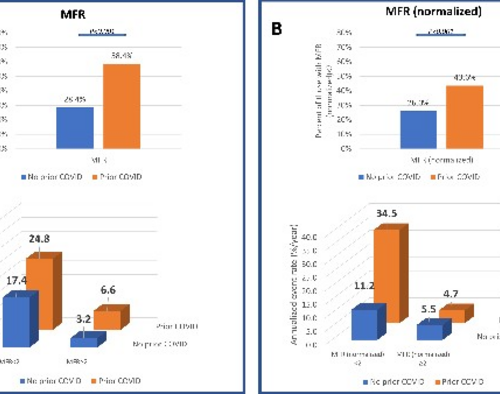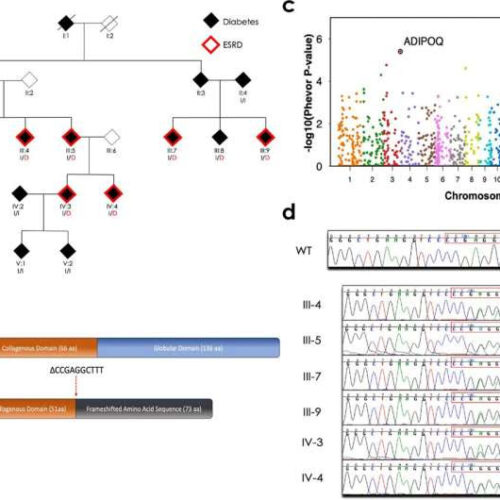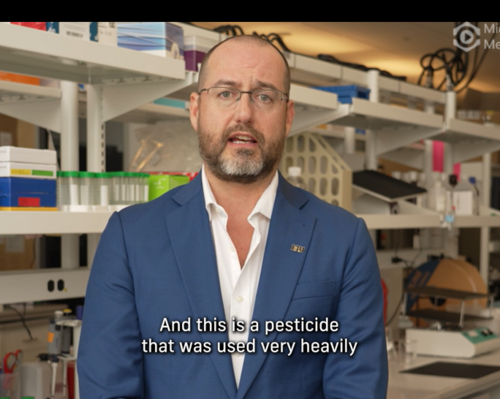by Columbia University Irving Medical Center STORK test can be used in the doctor’s office to determine if a fetus or embryo has the right number of chromosomes. Credit: Columbia University Irving Medical Center A new prenatal test developed by researchers at Columbia University Fertility Center can determine if a fetus or embryo has the...
University of Arizona Professor wins NIH Trailblazer Award for using radar to prevent falls
UNIVERSITY OF ARIZONA COLLEGE OF ENGINEERING IMAGE: UNIVERSITY OF ARIZONA ASSISTANT PROFESSOR OF ELECTRICAL AND COMPUTER ENGINEERING SIYANG CAO WAS GRANTED AN NIH TRAILBLAZER AWARD FOR HIS WORK USING RADAR TO PREVENT FALLS FOR PEOPLE OVER 65. CREDIT: UNIVERSITY OF ARIZONA COLLEGE OF ENGINEERING More than 20,000 U.S. adults over 65 die as a result...
Reduced myocardial blood flow is new clue in how COVID-19 is impacting the heart
HOUSTON METHODIST IMAGE: A) PATIENTS WITH PRIOR COVID HAVE HIGHER RATES OF IMPAIRED MFR INDICATING CARDIOVASCULAR DISEASE B) IMPAIRED MFR IS ASSOCIATED WITH A HIGHER RATE OF ADVERSE EVENTS IN PATIENTS WITH NO PRIOR COVID AND THOSE WITH PRIOR COVID CREDIT: HOUSTON METHODIST Patients with prior COVID may be twice as likely to have unhealthy...
Pathway uncovered for most significant lupus genetic risk factor
A study suggests that researchers at Michigan Medicine have uncovered the molecular mechanism that drives the disease-causing effects of the most common genetic risk factor for lupus. Systemic lupus erythematosus is a common, incurable autoimmune disease affecting millions worldwide, with a particularly high prevalence among women. A genetic variant, called HLA-DRB1*03:01, is the greatest risk factor...
Scientists identify a plant molecule that sops up iron-rich heme
The peptide is used by legumes to control nitrogen-fixing bacteria; it may also offer leads for treating patients with too much heme in their blood. Symbiotic relationships between legumes and the bacteria that grow in their roots are critical for plant survival. Without those bacteria, the plants would have no source of nitrogen. This element is...
How should Pollen Food Syndrome be diagnosed and managed?
WILEY People with Pollen Food Syndrome (PFS)—also known as oral allergy syndrome or pollen food allergy syndrome—experience an allergic reaction when consuming raw plant foods, and triggers can vary depending on an individual’s pollen sensitization, which in turn is affected by geographical location. The British Society of Allergy & Clinical Immunology Standards of Care Committee...
Detection of rare genetic mutation in one family could lead to better diabetes treatments
by University of Utah Health Sciences Pedigree of the family enriched for diabetes and end-stage renal disease and identification of the ADIPOQ mutation. a The family pedigree, status of diabetes (shaded) and end-stage renal disease (ESRD; red outline), and the ADIPOQ mutation (p.Gly93GlufsTer73). Carriers of the wild-type ADIPOQ insertion (I) or mutated ADIPOQ deletion (D; red) are indicated. b The structure of the wild-type (top) and...
Musical tests can detect mental deterioration in old age
TEL-AVIV UNIVERSITY IMAGE: NETA MAIMON CREDIT: TEL AVIV UNIVERSITY Researchers at Tel Aviv University have developed a method that employs musical tests and a portable instrument for measuring brain activity to detect cognitive decline in old age. According to the researchers, the method, which is based on the measurement of 15 minutes of electrical activity...
FIU researchers discover how DDT exposure contributes to Alzheimer’s disease risk
FLORIDA INTERNATIONAL UNIVERSITY VIDEO: JASON RICHARDSON, PROFESSOR AT FLORIDA INTERNATIONAL UNIVERSITY’S ROBERT STEMPEL COLLEGE OF PUBLIC HEALTH & SOCIAL WORK, DISCUSSES A NEW STUDY THAT REVEALS HOW DDT EXPOSURE CONTRIBUTES TO ALZHEIMER’S DISEASE RISK. CREDIT: FLORIDA INTERNATIONAL UNIVERSITY MIAMI (Aug. 17, 2022) – A new study led by researchers from Florida International University (FIU) reveals a...
Study finds link between post-COVID loss of smell or taste and memory problems
FUNDAÇÃO DE AMPARO À PESQUISA DO ESTADO DE SÃO PAULO Studies conducted before the COVID-19 pandemic showed that loss of smell could be an early sign of the impending onset of Alzheimer’s disease. There is evidence in the scientific literature that this sensory disorder may appear years before the first cognitive symptoms, suggesting a link...






